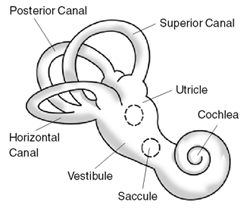Sense of balance
Sense of Balance[edit | edit source]
The sense of balance, also known as equilibrioception, is the physiological sense that allows humans and animals to maintain their body posture and orientation in relation to the surrounding environment. This sense is crucial for everyday activities and is primarily governed by the vestibular system located in the inner ear.
Anatomy of the Balance System[edit | edit source]
The balance system is a complex network that involves the vestibular system, visual system, and proprioception.
Vestibular System[edit | edit source]
The vestibular system is located in the inner ear and consists of the semicircular canals and the otolith organs (the utricle and saccule). These structures detect rotational movements and linear accelerations of the head, respectively.
Visual System[edit | edit source]
The visual system provides critical information about the body's position in relation to its surroundings. It helps in maintaining balance by providing visual cues that the brain uses to interpret motion and orientation.
Proprioception[edit | edit source]
Proprioception refers to the body's ability to sense its position and movement in space. It involves sensory receptors in the muscles, tendons, and joints that provide feedback to the brain about limb position and movement.
Physiology of Balance[edit | edit source]
The brain integrates information from the vestibular, visual, and proprioceptive systems to maintain balance. This integration occurs in the cerebellum, brainstem, and cerebral cortex.
Vestibulo-Ocular Reflex[edit | edit source]
The vestibulo-ocular reflex (VOR) stabilizes vision by coordinating eye movements with head movements. This reflex allows for clear vision while the head is in motion.
Postural Control[edit | edit source]
Postural control involves the coordination of muscle activity to maintain an upright position. The cerebellum plays a key role in adjusting muscle tone and coordinating movements to maintain balance.
Balance Disorders[edit | edit source]
Balance disorders can result from dysfunction in any part of the balance system. Common causes include inner ear infections, head injuries, and neurological disorders.
Symptoms[edit | edit source]
Symptoms of balance disorders include dizziness, vertigo, unsteadiness, and difficulty walking. These symptoms can significantly impact daily activities and quality of life.
Diagnosis[edit | edit source]
Diagnosis of balance disorders involves a thorough medical history, physical examination, and specialized tests such as videonystagmography (VNG) and rotary chair testing.
Treatment[edit | edit source]
Treatment depends on the underlying cause and may include vestibular rehabilitation therapy, medications, or surgery.
Related Pages[edit | edit source]
Search WikiMD
Ad.Tired of being Overweight? Try W8MD's NYC physician weight loss.
Semaglutide (Ozempic / Wegovy and Tirzepatide (Mounjaro / Zepbound) available. Call 718 946 5500.
Advertise on WikiMD
|
WikiMD's Wellness Encyclopedia |
| Let Food Be Thy Medicine Medicine Thy Food - Hippocrates |
Translate this page: - East Asian
中文,
日本,
한국어,
South Asian
हिन्दी,
தமிழ்,
తెలుగు,
Urdu,
ಕನ್ನಡ,
Southeast Asian
Indonesian,
Vietnamese,
Thai,
မြန်မာဘာသာ,
বাংলা
European
español,
Deutsch,
français,
Greek,
português do Brasil,
polski,
română,
русский,
Nederlands,
norsk,
svenska,
suomi,
Italian
Middle Eastern & African
عربى,
Turkish,
Persian,
Hebrew,
Afrikaans,
isiZulu,
Kiswahili,
Other
Bulgarian,
Hungarian,
Czech,
Swedish,
മലയാളം,
मराठी,
ਪੰਜਾਬੀ,
ગુજરાતી,
Portuguese,
Ukrainian
Medical Disclaimer: WikiMD is not a substitute for professional medical advice. The information on WikiMD is provided as an information resource only, may be incorrect, outdated or misleading, and is not to be used or relied on for any diagnostic or treatment purposes. Please consult your health care provider before making any healthcare decisions or for guidance about a specific medical condition. WikiMD expressly disclaims responsibility, and shall have no liability, for any damages, loss, injury, or liability whatsoever suffered as a result of your reliance on the information contained in this site. By visiting this site you agree to the foregoing terms and conditions, which may from time to time be changed or supplemented by WikiMD. If you do not agree to the foregoing terms and conditions, you should not enter or use this site. See full disclaimer.
Credits:Most images are courtesy of Wikimedia commons, and templates, categories Wikipedia, licensed under CC BY SA or similar.
Contributors: Prab R. Tumpati, MD




